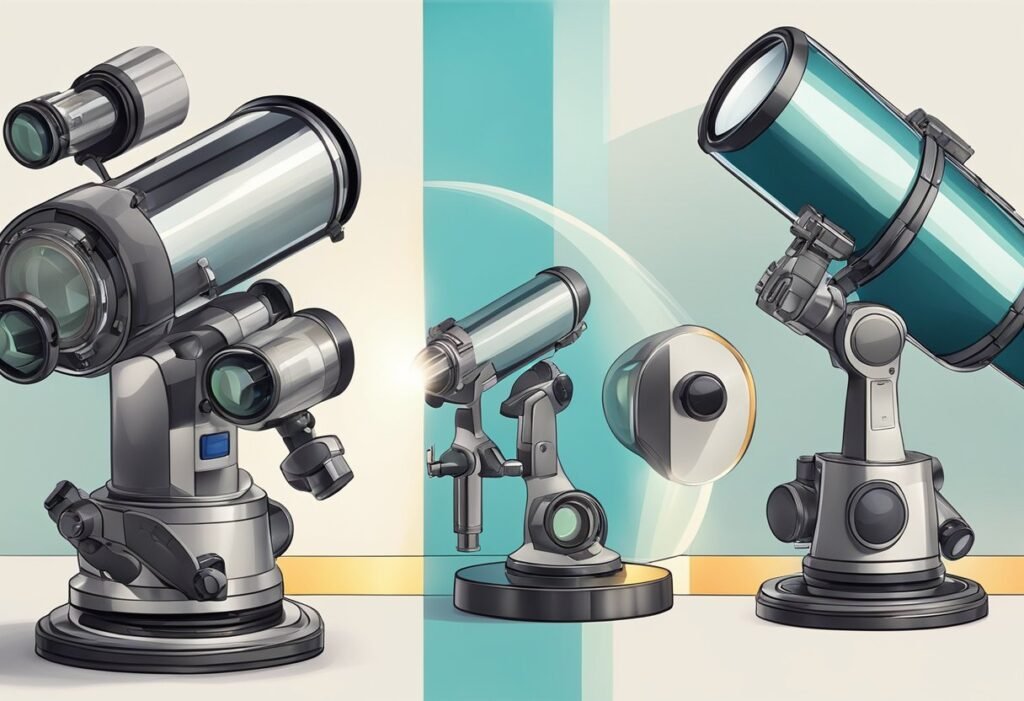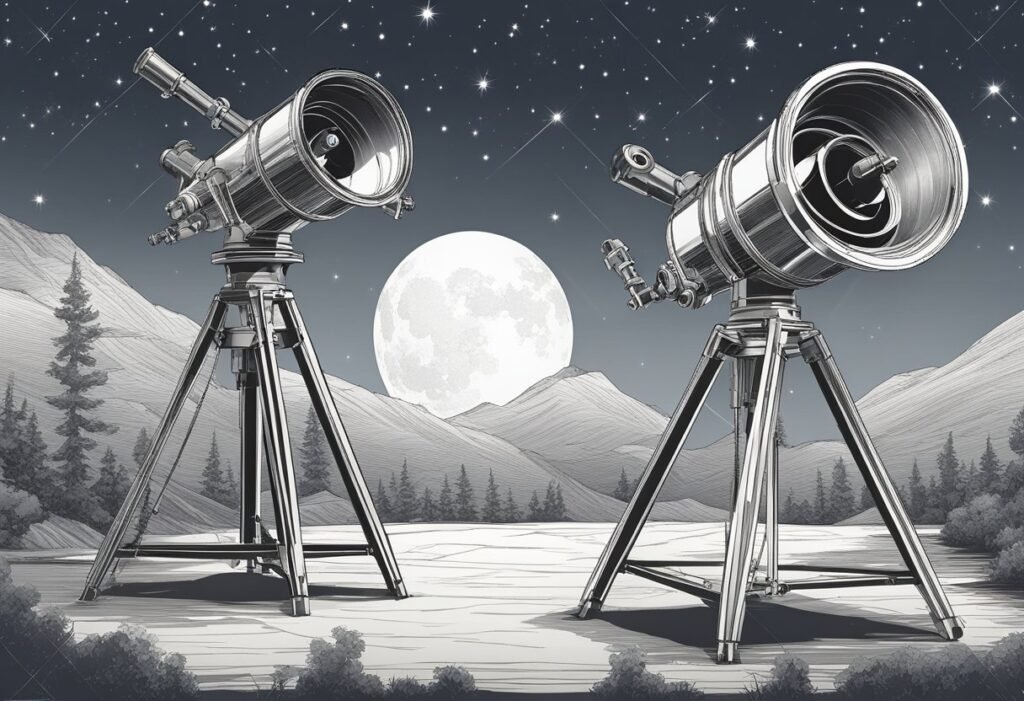When it comes to astronomy, telescopes are one of the most important tools for observing the night sky. However, with so many different types of telescopes available, it can be difficult to know which one is the best for your needs. In this article, we will be exploring the differences between reflector and refractor telescopes, and which one may be the best telescope for you.

First, let’s define what a reflector and refractor telescope are. A reflector telescope uses mirrors to reflect and focus light, while a refractor telescope uses lenses to refract and focus light. Both types of telescopes have their own unique advantages and disadvantages, and which one you choose will depend on what you plan to observe and your personal preferences. In the following paragraphs, we will be discussing the pros and cons of each type of telescope, and which one may be the best choice for different situations.
Table of Contents
Understanding Telescopes

When it comes to telescopes, there are two main types: reflector and refractor telescopes. Both of these types use different methods to gather and focus light, which ultimately affects their performance and suitability for different types of observations.
A refractor telescope uses lenses to gather and focus light, while a reflector telescope uses mirrors. Refractor telescopes are typically smaller and more portable, making them a good choice for beginners or those who need a telescope for casual observations. Reflectors, on the other hand, are often larger and more powerful, making them better suited for more serious astronomers or those who want to observe fainter objects.
One advantage of reflector telescopes is that they are often less affected by chromatic aberration, which is a distortion of the image caused by the lens. This can make them a better choice for observing objects with bright or contrasting colors.
However, reflectors do require more maintenance than refractors, as the mirrors need to be regularly cleaned and aligned to ensure optimal performance. Refractors, on the other hand, require little maintenance and are generally easier to use.
Ultimately, the choice between a reflector and refractor telescope comes down to personal preference and the specific needs of the observer. Both types have their advantages and disadvantages, and the best choice will depend on factors such as the type of observations you want to make, your level of experience, and your budget.
Reflector Telescopes

History and Design
Reflector telescopes, also known as reflectors, use mirrors to reflect and gather light. The design was first introduced by Sir Isaac Newton in the 17th century, and it remains a popular choice for amateur astronomers today.
The basic design of a reflector telescope consists of a concave primary mirror at the bottom of a tube, which reflects light to a smaller, flat secondary mirror placed at a 45-degree angle. The secondary mirror then reflects the light out of the side of the telescope and into the eyepiece.
Advantages of Reflectors
Reflectors have several advantages over refractors, including a wider field of view and a lower cost for the same aperture size. They are also generally easier to maintain and repair due to their simpler design.
Another advantage of reflectors is that they do not suffer from chromatic aberration, which is a problem in refractors caused by the different wavelengths of light being refracted at slightly different angles. This can result in a blurry or distorted image.
Common Reflector Models
There are several popular reflector models on the market, including the Dobsonian, which is a type of reflector telescope mounted on a simple, sturdy base. The Newtonian reflector is another popular model, which uses a parabolic primary mirror to reduce spherical aberration and improve image quality.
Other popular reflector models include the Cassegrain, which uses a combination of mirrors to fold the light path and achieve a longer focal length in a shorter tube, and the Ritchey-Chretien, which is a more complex design used in professional telescopes.
In conclusion, reflector telescopes offer several advantages over refractors, including a wider field of view, lower cost, and simpler design. They are a popular choice for amateur astronomers and come in a variety of models to suit different needs and preferences.
Refractor Telescopes
Optical Principles
Refractor telescopes use lenses to bend and focus light, resulting in a clear and crisp image. The objective lens is the main lens of the telescope and is responsible for gathering and focusing the light. The eyepiece is used to magnify the image formed by the objective lens. Refractors are known for their ability to produce high contrast images with sharp details, making them great for observing planets, the Moon, and other celestial objects.
Benefits of Refractors
One of the main advantages of refractor telescopes is that they require very little maintenance. Since they don’t have mirrors that need to be aligned, they are easy to use and require no collimation. Refractors are also great for astrophotography because they produce sharp and clear images with minimal distortion. Another benefit of refractors is that they are great for observing bright objects like the Moon and planets because they don’t suffer from the same light scattering that can occur in reflectors.
Popular Refractor Types
There are two main types of refractor telescopes: achromatic and apochromatic. Achromatic refractors use two lenses to correct for chromatic aberration, which is the distortion of colors that can occur when light passes through a lens. Apochromatic refractors use more advanced lens designs to correct for chromatic aberration and produce even sharper images. Some popular refractor telescopes include the Celestron NexStar 102SLT, the Orion SkyQuest XT8 Classic, and the Sky-Watcher ProED 120.
Comparative Analysis
Image Quality
When it comes to image quality, both reflector and refractor telescopes have their pros and cons. Refractor telescopes provide clear and sharp images, but they tend to have a smaller aperture, which limits their ability to gather light. On the other hand, reflector telescopes have a larger aperture, which allows them to gather more light and produce brighter images. However, reflector telescopes can suffer from issues such as coma and chromatic aberration, which can affect the quality of the image.
Maintenance and Durability
Reflector telescopes require more maintenance than refractor telescopes. The mirrors in reflector telescopes need to be aligned periodically, and they can be affected by dust and other debris. Refractor telescopes, on the other hand, require little maintenance, and their lenses are less prone to damage. In terms of durability, reflector telescopes tend to be more robust and can withstand rough handling better than refractor telescopes.
Portability
Refractor telescopes are generally more portable than reflector telescopes. They are smaller and lighter, making them easier to transport. Reflector telescopes, on the other hand, tend to be larger and heavier, which can make them difficult to move around. However, some reflector telescopes come with collapsible tubes, which make them more portable.
Cost Considerations
Refractor telescopes tend to be more expensive than reflector telescopes. This is because they use lenses made from high-quality glass, which can be costly to manufacture. Reflector telescopes, on the other hand, use mirrors, which are less expensive to produce. However, there are some high-end reflector telescopes that can be more expensive than entry-level refractor telescopes.
Overall, both reflector and refractor telescopes have their strengths and weaknesses. The choice between the two ultimately comes down to personal preference and the intended use of the telescope.
Use Cases and Recommendations
Amateur Astronomy
For those who are interested in amateur astronomy, both reflector and refractor telescopes can offer great viewing experiences. However, reflector telescopes are generally better suited for viewing deep space objects such as galaxies and nebulae. Refractor telescopes, on the other hand, are better for viewing planets and the moon due to their ability to produce sharper images with less distortion. We recommend a reflector telescope for those who are interested in observing deep space objects, while a refractor telescope is a better choice for those who want to observe planets and the moon.
Astrophotography
If you are interested in astrophotography, a reflector telescope is generally a better choice due to its larger aperture and shorter focal length. This allows for faster exposure times and better image quality. Refractor telescopes can also be used for astrophotography, but they are generally more expensive and may require additional equipment such as a field flattener or focal reducer. We recommend a reflector telescope for those who want to get into astrophotography.
Educational Purposes
For educational purposes, both reflector and refractor telescopes can be great choices. However, reflector telescopes are generally more affordable and easier to maintain, making them a better choice for schools and educational institutions. Refractor telescopes are often more expensive and require more maintenance due to their more complex design. We recommend a reflector telescope for educational purposes.
Professional Research
For professional research, both reflector and refractor telescopes can be used. However, refractor telescopes are often preferred due to their ability to produce sharper images with less distortion. Reflector telescopes are generally better suited for observing faint objects such as galaxies and nebulae due to their larger aperture. We recommend a refractor telescope for professional research, but a reflector telescope may also be suitable depending on the specific research needs.
Making the Right Choice
When it comes to choosing between a reflector and a refractor telescope, there is no one-size-fits-all answer. It really depends on what you want to observe and your personal preferences.
If you’re interested in observing deep-sky objects like galaxies and nebulae, a reflector telescope may be the better option. They typically have larger apertures and can gather more light than refractors, making them better suited for low-light conditions. However, reflectors require more maintenance than refractors, as the mirrors need to be realigned periodically.
On the other hand, if you’re interested in observing planets and the moon, a refractor telescope may be the better choice. They have a narrower field of view, which can make objects appear sharper and more detailed. Refractors also require less maintenance than reflectors, as they don’t have mirrors that need to be realigned.
Ultimately, the decision between a reflector and a refractor telescope comes down to personal preference and what you want to observe. We recommend doing some research and considering your observing goals before making a purchase.
Frequently Asked Questions
What are the advantages and disadvantages of refractor telescopes?
Refractor telescopes are known for their durability and low maintenance requirements. They are also great for observing bright objects such as the Moon and planets. However, they tend to be more expensive than reflector telescopes with the same aperture size. Refractors also suffer from chromatic aberration, which can cause color fringing around objects.
How do reflector telescopes compare to refractors in terms of image quality?
Reflector telescopes have larger apertures than refractors of the same price, which means they can gather more light and produce brighter images. They also don’t suffer from chromatic aberration. However, they require more maintenance due to their open tube design and may require collimation to keep the mirrors aligned.
Which type of telescope is more suitable for beginners, reflector or refractor?
Both types of telescopes can be suitable for beginners, but it ultimately depends on personal preference and budget. Refractor telescopes are easier to set up and use, but reflector telescopes can offer more bang for your buck in terms of aperture size.
For astrophotography, should one opt for a reflector or a refractor telescope?
Refractor telescopes are usually better for astrophotography due to their lack of chromatic aberration and sturdy design. However, reflector telescopes with larger apertures can also produce great images with the right equipment and techniques.
What are the differences in viewing planets with reflector versus refractor telescopes?
Refractor telescopes tend to produce sharper and more detailed images of planets due to their lack of central obstruction. However, reflector telescopes with larger apertures can still produce great planetary views.
What do professional astronomers typically use, reflector or refractor telescopes?
Professional astronomers use a variety of telescopes depending on their research needs. However, refractor telescopes are often used for planetary observations and imaging due to their sharpness and lack of chromatic aberration. Reflector telescopes with larger apertures are often used for deep space observations.





